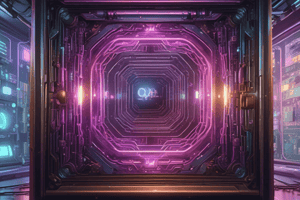Podcast
Questions and Answers
What is the main difference between augmented reality (AR) and virtual reality (VR)?
What is the main difference between augmented reality (AR) and virtual reality (VR)?
AR superimposes computer-generated images over real-world environments, while VR creates simulated worlds where users can interact.
How have blockchains evolved beyond digital currencies?
How have blockchains evolved beyond digital currencies?
Blockchains have revolutionized sectors like supply chain management, identity verification, and voting systems.
What are some of the sectors that have been revolutionized by blockchains?
What are some of the sectors that have been revolutionized by blockchains?
Supply chain management, identity verification, and voting systems.
What are some potential applications of augmented reality (AR) and virtual reality (VR) technologies?
What are some potential applications of augmented reality (AR) and virtual reality (VR) technologies?
How do immersive technologies like AR and VR impact everyday life?
How do immersive technologies like AR and VR impact everyday life?
Flashcards are hidden until you start studying
Study Notes
Exploring Five Intriguing Aspects of Technology
Technology is ever-evolving, shaping our daily lives through innovations big and small. Let's delve into five intriguing aspects within this broad domain, keeping it simple yet informative.
Artificial Intelligence (AI)
AI is transforming the world by enabling machines to learn from experience, adapt to new situations, and perform tasks previously thought to require human intelligence. From chatbots answering customer queries to advanced medical diagnostics systems, AI is revolutionizing industries across the globe.
Quantum Computing
Quantum computing holds immense promise due to its ability to solve problems that classical computers cannot address efficiently. By leveraging quantum bits instead of traditional binary digits, these powerful machines hold potential applications such as molecular simulations, cryptography, and optimization algorithms.
Internet of Things (IoT)
The IoT refers to interconnected devices collecting and exchanging data with minimal human interaction. Examples range from smart homes automating lighting and temperature control to industrial settings monitoring equipment performance. This network of connected objects has opened doors to unprecedented efficiency gains and novel consumer experiences.
Blockchain
Blockchain technology offers decentralized ledger systems offering increased security and transparency while eliminating middlemen. Originally developed for Bitcoin, blockchains have evolved beyond digital currencies to revolutionize various sectors like supply chain management, identity verification, and voting systems.
Augmented Reality (AR) and Virtual Reality (VR)
Augmented reality superimposes computer-generated images over real-world environments, enhancing users' interactions. Meanwhile, virtual reality creates simulated worlds where users can interact naturally using specialized headsets. These immersive technologies open possibilities in education, training, gaming, and social connections.
Each of these aspects of modern technology presents unique opportunities for innovation and growth, impacting everyday life in remarkable ways. Regardless of your interest – whether you’re an avid gamer exploring VR adventures or an engineer designing powerful quantum algorithms – there will always be something exciting to discover within the diverse technological landscape!
Studying That Suits You
Use AI to generate personalized quizzes and flashcards to suit your learning preferences.



